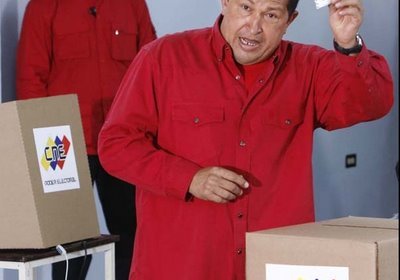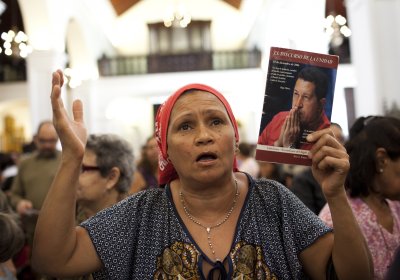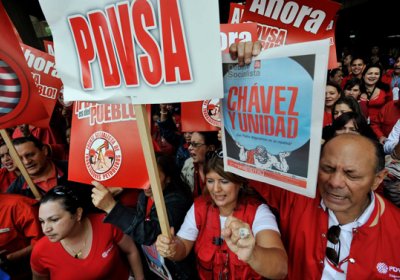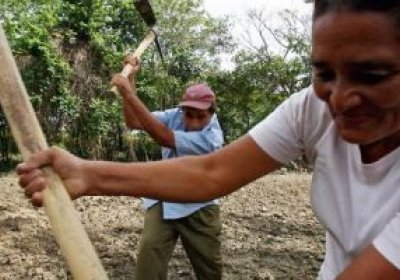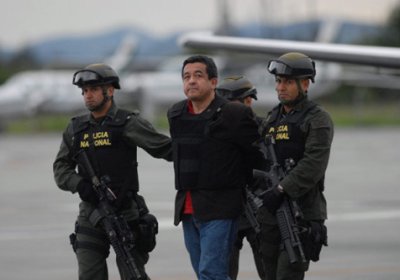More than 2000 workers marched to the National Assembly in Caracas on July 26 in support of increased workers’ control.
Handing over a document with more than 45,000 signatures, the workers demanded that the legislative body approve the Special Law for Socialist Worker Councils and begin an immediate discussion of a “new and revolutionary” Organic Work Law (LOT).
Both demands were submitted under article 240 of the Venezuelan constitution, which allows the people the right to legislate.
Venezuela
Venezuelan foreign affairs minister Nicolas Maduro has criticised the US government for having an “absurd and extremist” policy with regards to Venezuela.
Maduro made the comments after the publication of a report in late July that outlines the US government’s tactics for dealing with transnational criminal organisations.
The document cites Venezuela as a country that promotes a “permissive environment for narco-trafficking and terrorist organisations”.
In early July, Venezuela’s Social Investigation Group XXI (GIS) released new comparative data on electoral fairness in the country compiled by the Canada-based Foundation for Democratic Advancement (FDA) which found Venezuela’s elections to be “exceptionally fair, and thereby highly democratic”.
No sooner had information come out that Venezuelan President Hugo Chavez was undergoing surgery in Cuba than the international media was full of speculation and rumours regarding his imminent demise.
Projecting their hopes that an illness could succeed in removing Chavez where military coups and assassination attempts had failed, the right-wing Venezuelan opposition went into overdrive.
They demanded the president step down and hand over power to the vice president.
The Venezuelan News Agency published the article below on June 5. The decision to freeze relations with the US government came after the US imposed sanctions on Venezuela's state-owned oil company, PDVSA, over economic ties with Iran.
* * *
Relations between Venezuela and the US are frozen, said Venezuela's foreign minster Nicolas Maduro.
Maduro said the government of President Hugo Chavez has tried to restore respectful dialogue with Washington.
Maduro said the Venezuelan government aspired to have relations of respect and open communication.
The statement below was released on May 28 by the Australia-Venezuela Solidarity Network. For more information on the AVSN, visit www.venezuelasolidarity.org .
* * *
On May 24, the United States’ State Department unilaterally imposed sanctions against Venezuela’s state-owned oil company, Petroleos de Venezuela, S.A. (PDVSA). The State Department accused PDVSA of undermining the US sanctions against Iran by sending two cargo ships delivering US$50 million worth of reformate ― a gasoline blending component used to improve the quality of gasoline.
When I asked Alfredo, a dairy farmer and president of the Prolesa milk processing co-operative in Tachira state, what food sovereignty meant to him, he said: “Food sovereignty is not only about being able to produce enough food to feed ourselves, it also means getting to a point where we can export food to other countries.
Having arrived back in Caracas after more than two weeks visiting various rural communities, leaders from the National Campesino Front Ezequiel Zamora (FNCEZ) told us that the bodies of two of their comrades, missing since April 12, had been found.
Jose Joel Torres Leves and Agustin Gamboa Duran were leading land reform activists in the Comunal City Antonio Jose de Sucre, in Barinas state.
No sooner had the International Institute for Strategic Studies (IISS) released its dossier The FARC Files: Venezuela, Ecuador and the Secret Archive of Raul Reyes on May 10, that the international media was once again claiming more proof that Venezuelan government links to terrorism had been uncovered.
Almost none mention that the entire basis of the document were files that Interpol and US and Colombian officials have admitted are dubious at best.
The Socialist Alliance calls on the Colombian government to immediately release independent media activist Joaquin Perez Becerra, who is now facing charges of “terrorism”.
A number of left groups in Venezuela and solidarity groups internationally have expressed concern over the April 23 decision by Venezuelan authorities to arrest well-known Colombian journalist and supporter of the Venezuelan revolution, Joaquin Perez Becerra.
Perez Becerra was arrested when he tried to enter the country through Caracas Airport. He was deported two days later to neighbouring Colombia to face trial for supposed “terrorism” charges in Colombia.
The Venezuelan government has repeated its request to the United States government for the extradition of terrorist and ex-CIA agent Luis Posada Carriles. Posada Carriles was found not guilty by a Texas court on April 8 of charges of violating US immigration law.
Posada Carriles is wanted by Venezuela for his role in blowing up a Cuban plane in 1976. The plane’s 73 passengers, all civilians, were killed. Posada Carriles escaped from a Venezuelan prison in 1985.
Venezuela’s foreign ministry issued the statement abridged below on April 8.
* * *
- Previous page
- Page 55
- Next page

